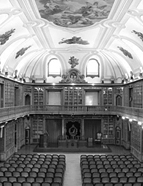

Moreover, the Faculties of Arts emerged with an additional research establishment, namely the Institute of Historical Studies (IEH). It included the departments of Philology, History and Philosophy. It was governed by a board, composed of the department directors and presided over by the Dean of the Faculty. In addition to all the students enrolled at the Faculty, «other individuals, with or without a degree, who wished to conduct scientific research in line with the aims of the Institute" (decree of 19 August 1911) were also members of the Institute».
The history of this research institute was marked by a series of ups and downs, beginning with the search for a location where it would be housed. The greatest difficulties, however, were mainly due to the autonomous drive of each department, subsumed later, as far as languages were concerned, by the rooms and institutes created by the development of the Cursos de Férias [Holiday Courses] (1925). In fact, the Philology and Philosophy departments successively detached themselves from the global IEH statutes. In this shift towards differentiation, the IEH eventually became a mere specific body of History per se (1925), and from 1932 until the initial move to the current Faculty building, under the terms of a decree of December 1930, enjoyed the title of Instituto de Investigação Científica [Scientific Research Institute]. This proposal was presented and approved in the Faculty Council on 12 December 1932, claiming to be an officialization, a formality that had also occurred in 1927 by virtue of the new Estatuto da Instrução Universitária [University Instruction Statute] of 1926. But its history since 1911, and the research texts produced therein, which substantiated each of the above-mentioned proposals leave no doubt as to its original nature.
A. de Vasconcelos had held the position of director of the History department since the beginning of the IEH (global), in addition to being the natural president of the board of this Institute as director of the Faculty (1911-1920). He was also director of the IEH, in the narrow sense, until his retirement when he was succeeded by Damião Peres. With the honours that were later bestowed upon him, the Institute came to be called his, as indeed it had always been, from 7 December 1937, on the occasion of the University's centenary celebrations which continued until the April 1974 revolution, however national research policy (JEN) had changed. Within the scope of the latter, a Centre for Historical Studies was created which had already been subsidised by the Institute for High Culture (1936-1952) in 1940, and continued until 1976, under the name of the Institute for High Culture.
